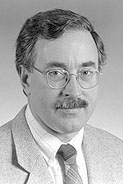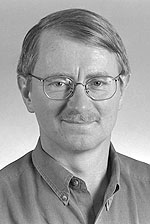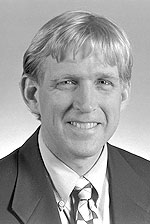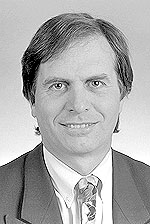



Alexander W. Clowes, MD
Division Chief
Kaj Johansen, MD
Providence
Mark Meissner, MD
Harborview
Steve Nicholls, MD
Harborview
Background and rationale of the Endovascular Program at the University of Washington
Endovascular Vision Statement
Provide state-of-the-art treatment for patients suffering from aneurysms and blocked arteries
Teach students, residents, fellows, practicing physicians
Research device design, methodology, and outcome measures, clinical outcomes, cellular/molecular pathology
Our Endovascular Program is comprehensive and designed to treat occlusive disease, dissections (tearing of the artery wall), and traumatic injuries in addition to standard aneurysms. Treatment methods include stents, stent grafts, atherectomy devices (to core out plaque through catheters), angioscopy, conventional surgery, and minimally-invasive surgery. The program includes prevention of restenosis through catheter delivery of agents such as drugs, antisense oligonucleotides (a form of gene therapy), and radiation. We provide the newest and best therapies for our patients, as well as training for our student doctors and other physician colleagues in the Northwest. We are also participating in the development and evaluation o f new methods and devices.
The strength of our program comes from both depth and breadth. We have a large patient base and excellence in noninvasive diagnosis, along with superb training programs. Our leading research in vascular biology is coupled with interest and experience in clinical trials, and we have developed a strong partnership between vascular surgery and interventional radiology. Dr. Ted Kohler (Division of Vascular Surgery) and Dr. David Glickerman (Division of Radiology) are Program Directors. The Division of Vascular Surgery has expertise in surgical management, clinical evaluation, noninvasive follow-up, development of prosthetic devices, and vascular biology. Radiology has strong interventional radiologists with superb catheter skills, experience with endovascular grafts for aneurysm disease, established expertise in angioplasty and stenting, and active research in stent design.
Participation by Cardiothoracic Surgery is a particularly important component of our program. Surgical treatment of diseases of the aorta in the chest such as dissections, aneurysms, or traumatic disruptions, can be quite challenging . Endovascular repair of these lesions may be much safer, quicker, and less expensive. Dr. Brad Hofer, Cardiothoracic Surgery, has taken the lead in this aspect of the program, which was initiated with the successful placement of a stent graft at the University of Washington Medical Center for a leaking, thoracic aneurysm in an 86-year-old who was deemed to be to ill for conventional aneurysm repair. He was treated in January, 1998, and is doing well at home after a brief hospital stay.
The Endovascular Suite at the Seattle Division of the VA Puget Sound Health Care System
Our program has a brand new Endovascular Suite at our VA hospital. It has new Phillips angiography equipment ($1.4 million) in a fully capable, 660 square-foot operating room. This facility is completely state-of-the-art and second to none in its ability to combine surgical and radiologic approaches to vascular disease. Plans are underway to provide similar facilities at the University Medical Center and Harborview Medical Center.
Research
Research efforts include evaluation of current devices and development of new devices (see Dr. Clowes or Dr. Kohler's), development of vascular imaging techniques (see Dr. Strandness, Dr . Zierler, Dr. Hatsukami), development of new techniques for minimally invasive surgery, study of the vascular biology associated with healing and failure of these devices (s ee Dr. Kohler, Dr. Clowes), study of delivery systems for agents to prevent restenosis, and clinical trials .
(Photos below are of members of the division of vascular surgery at the UW)
|
|
|
|
|
|
Alexander W. Clowes, MD |
Kaj Johansen, MD |
Mark Meissner, MD |
Steve Nicholls, MD |
|
|
|
|
|
|
Gene Zierler, MD |
Ted Kohler, MD |
Tom Hatsukami, MD |
Further information
Drs. Kohler kohler@u.washington.edu and Glickerman glickerman@seattle.va.gov are available to provide continuing medical education, patient education, and written information for anyone interested in endovascular therapy. They can be reached at the following numbers:
Dr. Ted Kohler (206) 764-2245
Dr. David Glickerman (206) 764-2444
Back to the endovascular program home page: